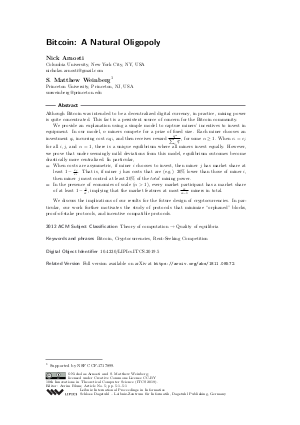Bitcoin: A Natural Oligopoly
Authors Nick Arnosti, S. Matthew Weinberg
-
Part of:
Volume:
10th Innovations in Theoretical Computer Science Conference (ITCS 2019)
Part of: Series: Leibniz International Proceedings in Informatics (LIPIcs)
Part of: Conference: Innovations in Theoretical Computer Science Conference (ITCS) - License:
 Creative Commons Attribution 3.0 Unported license
Creative Commons Attribution 3.0 Unported license
- Publication Date: 2019-01-08
File

PDF
LIPIcs.ITCS.2019.5.pdf
- Filesize: 264 kB
- 1 pages
Document Identifiers
Related Versions
-
Full version available on arXiv at https://arxiv.org/abs/1811.08572.
Subject Classification
ACM Subject Classification
- Theory of computation → Quality of equilibria
Keywords
- Bitcoin
- Cryptocurrencies
- Rent-Seeking Competition
Metrics
- Access Statistics
-
Total Accesses (updated on a weekly basis)
0PDF Downloads0Metadata Views
Abstract
Although Bitcoin was intended to be a decentralized digital currency, in practice, mining power is quite concentrated. This fact is a persistent source of concern for the Bitcoin community. We provide an explanation using a simple model to capture miners' incentives to invest in equipment. In our model, n miners compete for a prize of fixed size. Each miner chooses an investment q_i, incurring cost c_i q_i, and then receives reward (q_i^alpha)/(sum_j q_j^alpha), for some alpha >= 1. When c_i = c_j for all i,j, and alpha = 1, there is a unique equilibrium where all miners invest equally. However, we prove that under seemingly mild deviations from this model, equilibrium outcomes become drastically more centralized. In particular, - When costs are asymmetric, if miner i chooses to invest, then miner j has market share at least 1-c_j/c_i. That is, if miner j has costs that are (e.g.) 20% lower than those of miner i, then miner j must control at least 20% of the total mining power. - In the presence of economies of scale (alpha > 1), every market participant has a market share of at least 1-1/(alpha), implying that the market features at most alpha/(alpha - 1) miners in total. We discuss the implications of our results for the future design of cryptocurrencies. In particular, our work further motivates the study of protocols that minimize "orphaned" blocks, proof-of-stake protocols, and incentive compatible protocols.
Cite As Get BibTex
Nick Arnosti and S. Matthew Weinberg. Bitcoin: A Natural Oligopoly. In 10th Innovations in Theoretical Computer Science Conference (ITCS 2019). Leibniz International Proceedings in Informatics (LIPIcs), Volume 124, p. 5:1, Schloss Dagstuhl – Leibniz-Zentrum für Informatik (2019)
https://doi.org/10.4230/LIPIcs.ITCS.2019.5
BibTex
@InProceedings{arnosti_et_al:LIPIcs.ITCS.2019.5,
author = {Arnosti, Nick and Weinberg, S. Matthew},
title = {{Bitcoin: A Natural Oligopoly}},
booktitle = {10th Innovations in Theoretical Computer Science Conference (ITCS 2019)},
pages = {5:1--5:1},
series = {Leibniz International Proceedings in Informatics (LIPIcs)},
ISBN = {978-3-95977-095-8},
ISSN = {1868-8969},
year = {2019},
volume = {124},
editor = {Blum, Avrim},
publisher = {Schloss Dagstuhl -- Leibniz-Zentrum f{\"u}r Informatik},
address = {Dagstuhl, Germany},
URL = {https://drops.dagstuhl.de/entities/document/10.4230/LIPIcs.ITCS.2019.5},
URN = {urn:nbn:de:0030-drops-100989},
doi = {10.4230/LIPIcs.ITCS.2019.5},
annote = {Keywords: Bitcoin, Cryptocurrencies, Rent-Seeking Competition}
}
Author Details
Funding
- Weinberg, S. Matthew: Supported by NSF CCF-1717899.
